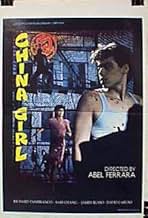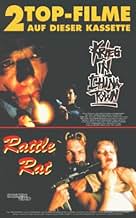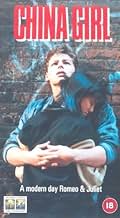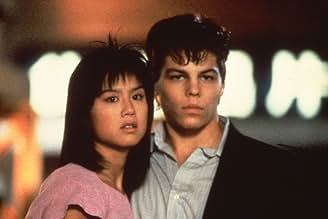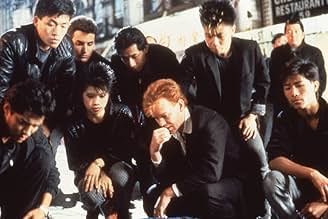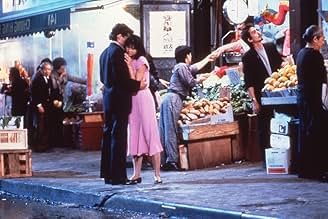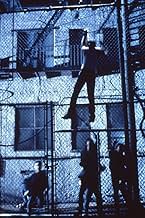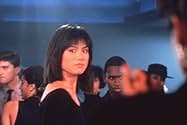VALUTAZIONE IMDb
6,3/10
2681
LA TUA VALUTAZIONE
Aggiungi una trama nella tua linguaAn Italian boy and Chinese girl fall in love in New York, igniting a conflict between their ethnic gangs.An Italian boy and Chinese girl fall in love in New York, igniting a conflict between their ethnic gangs.An Italian boy and Chinese girl fall in love in New York, igniting a conflict between their ethnic gangs.
- Regia
- Sceneggiatura
- Star
- Premi
- 1 candidatura in totale
Recensioni in evidenza
'China Girl' is easily Abel Ferrara's most conventional and commercial movie to date. Thankfully it improves on his previous movie 'Fear City', which was too compromised and "Hollywood" to succeed. The story is a basic updating of Romeo And Juliet set against the background of Chinese and Italian gang rivalry. Newcomers Richard Panebianco and Sari Chang play Tony and Tye the ill fated lovers who continue their forbidden romance against pressure from their family and friends. Neither actor has went on to all that much but they are both more than adequate and make a sweet couple. The real action comes from solid performances by James Russo ('Donnie Brasco'), David Caruso ('Kiss Of Death'), Russell Wong ('The Prophecy 2'), Paul Hipp ('Teenage Caveman') and Joey Chin ('Year Of The Dragon'), many of whom went on to work with Ferrara on later projects. It was also good to see Judith Malina ('Dog Day Afternoon') and veteran character actor James Hong ('Big Trouble in Little China') in supporting roles. While by no means as flamboyant and confrontational as Ferrara's best known work, this is a surprisingly entertaining story which should appeal to a much wider audience than his "difficult" but rewarding movies such as the stunning 'Bad Lieutenant' or the fascinating 'The Addiction'. This movie doesn't deserve its obscurity and is well worth a rental.
China Girl was a hip and very violent movie, I wish I saw at the cinema, when I had the chance. Italian boy falls for Chinese Girl-true romance, a reciprocated love. Now, here's the impasse: they're both related to warring gangs, even though the Italians, really the good guys, do have it in for the Chinese, where this Chinese Gang are part of a mafia, merely puppets on a string. When the Italian boy, Gino (an impressive Richard Panebianco) narrowly escapes having his lights punched out, when chased by the Chinese gang, the head the lovestruck girl's brother, this doesn't detur him or her, from further progressing the relationship, where they keep sneaking off like little children, despite warnings from their older protectors. As Wong, an Asian actor I love watching, says to her little Sis, Thai (an equally impressive Sari Chang) "You don't understand, you're nothing but a chink to them". I appreciated Wong's honesty, here, where honor runs high among this race. Wong was never truer in his words, too. Gino's older brother, Alby, and his friends are racist goons. In particular is red haired Caruso, who I loved in this, despite playing a d..khead immature character of loathing. One scene has him ordering egg rolls, while disrespectfully making squinting eyes at some Asian cooks nearby, while also insulting the ones serving him. Now that's a d..khead. Panebianco sets him straight defending the Chinese, where a physical fight almost ensues. It would of been good to see how it ended up, if Russo hadn't stepped in, but we know all too well, that Caruso would of one won, ending this conversation by getting Panebianco in a headlock, simmering him, then cutting him loose, where Panebianco would of just shrugged him off, and walked away. It is too, the worst fitting time, for these gangs to be in an escalating turf war, a war which of course, is also personal, caused by our love struck duo, as the Asian and Italian mafia head are trying to make a peace, a business negotiation. This is complicated by the arch enemy gangs, feuding, the main plot of the story, which I really liked. China Girl has great pumping music, it's finale song, I loved, after one of the most memorable and tragic climaxes I've seen. It's a simple message told throughout it's story, the consequences of hate and racism, that we don't just have to view it on screen. The exterior shot settings of Chinatown, and the Italian hood are well chosen. This Romeo and Juliet tale, minus the happy ending, but with stylized violence, a plus, has some great action sequences, one involving a shootout I loved, that ended with Caruso's crazed look, as he mouthed "Mother fu..ers" through clenched teeth. China Girl has it all, where the action/blood craving viewer will get his three dollars worth. One of the '88 movie treats. One of Ferrara's best. Personally, China Girl is his favorite, in his list of filmographies.
Chinese gangs vs. Italian gangs in NYC in 1987. Tony (Richard Panebianco) and Tye (Sari Chang) meet and fall in love. Meanwhile Tye's brother hates all Italians and Tony's friends hate Chinese.
If you've seen "West Side Story" you know how this ends--but a bit more tragically in this movie. Plotwise it's very obvious but it's beautifully done. Filmed with energy, beautifully atmospheric (the sets and lighting are incredible), and full of bursts of ultraviolence. Most of the roles are well acted, especially by James Russo, David Caruso (chewing the scenery) and Russell Wong. As the young lovers Panebianco and Chang are, unfortunately, not that good. In a way it's understandable--he was only 16 when this was made and it's the first role for both. They're both very attractive (Panebianco is pretty buff with a baby face; Chang is delicate and beautiful) but have little to do other than kiss and act like they love each other. That isn't believable either since they have zero sexual chemistry. Still, they are sympathetic characters. Also, in a nice touch, Panebianco shows more skin than Chang in their sex scene.
This is really obscure and it doesn't deserve it. It had almost no release in 1987 (there were no stars to sell it) and was never a big hit on cable or video. Also Chang never made another movie and Panebianco disappeared after making a few more films (Whatever happened to him? He showed a lot of promise.). That's too bad--this deserves a bigger audience. Worth watching on cable or renting.
If you've seen "West Side Story" you know how this ends--but a bit more tragically in this movie. Plotwise it's very obvious but it's beautifully done. Filmed with energy, beautifully atmospheric (the sets and lighting are incredible), and full of bursts of ultraviolence. Most of the roles are well acted, especially by James Russo, David Caruso (chewing the scenery) and Russell Wong. As the young lovers Panebianco and Chang are, unfortunately, not that good. In a way it's understandable--he was only 16 when this was made and it's the first role for both. They're both very attractive (Panebianco is pretty buff with a baby face; Chang is delicate and beautiful) but have little to do other than kiss and act like they love each other. That isn't believable either since they have zero sexual chemistry. Still, they are sympathetic characters. Also, in a nice touch, Panebianco shows more skin than Chang in their sex scene.
This is really obscure and it doesn't deserve it. It had almost no release in 1987 (there were no stars to sell it) and was never a big hit on cable or video. Also Chang never made another movie and Panebianco disappeared after making a few more films (Whatever happened to him? He showed a lot of promise.). That's too bad--this deserves a bigger audience. Worth watching on cable or renting.
Director Abel Ferrara hit's the street's with this modern take on Shakespeare's Romeo and Juliet set amongst waring Italian and Chinese gangs
this is more so the younger generation
as the much older and wiser mafia / triad figures set out for peace so they don't draw unwanted attention from the man in blue. However these young-guns make it a battleground and caught between it is two love-struck lovers; a Chinese girl Tayn-Hwa and Italian lad Tony Monte. They don't care about colour or race, despite what's happening all around them and what it could do to them or even loved ones.
There's no real surprises to the old hat, if simply low-key material (which was penned by Ferrara's collaborator Nicholas St. John), as we pretty much know how this dangerous story plays out and eventually finishes, however director Ferrara has a gritty, but devoted style and upbeat tempo that's uniquely his own that elevates the conventional framework with his striking eye for a sense of place and powerfully lasting imagery that's uncompromising. He does more than just direct from the screenplay. The concentration on the tough, smoky urban setting (with excellent location photography of New York's bordering neighbourhoods Chinatown and little Italy), helps build a seedy atmosphere where hatred and violence is simply waiting to boil over, as obsession and pride becomes a death wish. Ferrara polarises it very well, especially the conflict not between (which is still quite blistering), but within the same races seeking out honour in who they are ---- this is where it was at its strongest, because the forbidden love angle (while important to the plot's progression) did stall and take away from some of the underlining tension. Although outside of its pushy race card slant, it does feel like it's just building up these explosive acts to glorify its foreseeable conclusion. Joe Delia's melancholy score fits in perfectly.
The performances are down-to-earth and genuinely projected by its cast. Richard Panebianco and Sari Chang are sympathetically touching as the two lovebirds. An admirable James Russo and especially a hot-headed David Caruso bring an unstoppable intensity to their roles. Russell Wong is quite laid-back in a sound performance, in his quest to please his elders by controlling his gang and that of his wayward sister. Journeyman actor James Hong pops up, as well as Robert Miano as heavies.
You might call it lesser Ferrara compared to his other works, but it's involving and efficiently handled with his trademark raw and brutal edge shining through.
There's no real surprises to the old hat, if simply low-key material (which was penned by Ferrara's collaborator Nicholas St. John), as we pretty much know how this dangerous story plays out and eventually finishes, however director Ferrara has a gritty, but devoted style and upbeat tempo that's uniquely his own that elevates the conventional framework with his striking eye for a sense of place and powerfully lasting imagery that's uncompromising. He does more than just direct from the screenplay. The concentration on the tough, smoky urban setting (with excellent location photography of New York's bordering neighbourhoods Chinatown and little Italy), helps build a seedy atmosphere where hatred and violence is simply waiting to boil over, as obsession and pride becomes a death wish. Ferrara polarises it very well, especially the conflict not between (which is still quite blistering), but within the same races seeking out honour in who they are ---- this is where it was at its strongest, because the forbidden love angle (while important to the plot's progression) did stall and take away from some of the underlining tension. Although outside of its pushy race card slant, it does feel like it's just building up these explosive acts to glorify its foreseeable conclusion. Joe Delia's melancholy score fits in perfectly.
The performances are down-to-earth and genuinely projected by its cast. Richard Panebianco and Sari Chang are sympathetically touching as the two lovebirds. An admirable James Russo and especially a hot-headed David Caruso bring an unstoppable intensity to their roles. Russell Wong is quite laid-back in a sound performance, in his quest to please his elders by controlling his gang and that of his wayward sister. Journeyman actor James Hong pops up, as well as Robert Miano as heavies.
You might call it lesser Ferrara compared to his other works, but it's involving and efficiently handled with his trademark raw and brutal edge shining through.
It's a story told so many times it belongs to our cultural DNA, the heartbreaking tale of star-crossed lovers, featuring more or less the same archetypes: tribal rivalries, protective siblings, forbidden rendezvous, declarations of undying love and ultimately a tragic ending... it's a story told in bloody letters and that found its deepest resonance in the deaths of Juliet and her Romeo. But it wasn't the first romance of its kind as men always knew the meaning and value of love, and of hatred (as both go along anyway).
The story never gets old because it's about enduring values for every culture and civilization: love and family, both seal the idea that our hearts can't evolve in autopilot mode, we either belong to our inner circle or the person we love, never to ourselves and this might be the source of some antagonism. Out of love, one is willing to free himself from the clan to belong to the outsider, contradicting the traditional vision of love as a tool to perpetuate the tradition, to ensure transmission, a mean to a non-end. One who is alone is always weaker.
And it's not surprising that Abel Ferrara, of all the directors, used the "Romeo and Juliet" or "West Side Story" canvas to make his "China Girl", he does care for the romance and handles it with sweet sensitivity but to better insist on the clan systems that make it impossible and doomed. The love story is between a young Italian-American played by Richard Panebianco (he was 16 during the film) and Tye, a beautiful Chinese girl played by Sari Chang. The romance works but even more as the subplot of something a little more in line with Ferrara's universe, a gang war between kids from Little Italy and Chinatown, a fight for territory, enhancing the necessity of sticking together, making the lone wolf the weakest link, and codifying love under the rule of "blood".
"China Girl" isn't a remake of the Jets vs. the Sharks antagonism despite the similarities (even the hero's name is Tony), but a violent commentary on urban youth and its natural inclination for violence driven by pride, the more you love your own, the less you care for the other and sometimes, the stronger you despise him. The film opens with a misleading scene showing a Cantonese restaurant being built under the sorry eyes of an Italian neighborhood. In the pizzeria right from the other side, James Russo (he's Tony's brother and has connections with the local mob boss played by Robert Miano), we see the war coming between two cultures. But the film toys with archetypes to better subvert them, revealing depths that are a credit to Ferrara's intelligence.
Indeed, the real antagonism isn't intercultural but intergenerational, while the young ones try to make ends meet by spreading their influence or forcing local shops to pay tributes in exchange of protection, their elders try to maintain peace. We see in a crucial face-off between the local Mafioso and the Chinese "Godfather" (played by James Hong) that the young punks only bring disturbance, interfering with their own interests. In a way, the young generation is lead to its own, paradoxically acting against their elders' values while duplicating them. It's ironic that Tye's brother (Russell Wong) wants to protect her from seeing an Italian while his uncle is treating with one.
These quiet drama moments show that this is not your usual urban warfare though the racist undertones are much real, the catalyst is a cultural self-preservative instinct that predominates in the hearts of young people and make them act violently and desperately. That's the real tragedy: that violence might be targeting the other but is somewhat directed toward yourself.
Ferrara has often been labeled as a poor man's Scorsese and it's tempting to spot the similarities between his urban landscape and exploration of tribal violence with films like "Mean Streets" (the film even features the obligatory Virgin Mary procession in that iconic street) but Ferrara injects his own iconoclast perception. His film doesn't really condemn violence (without endorsing it) as much as it highlights its deep roots in social units. In his "Funeral" film, brothers were all united in the imminence of their downfall, in "Bad Lieutenant" a cop was contaminated by the moral corruption he faced every day. And even "Body Snatchers" showed that the trouble can come from within and that perhaps there's no possible deliverance as long as we "belong" to a group.
It's a vicious circle where violence isn't exactly an evil but an inevitable path to cross, maybe a rite of passage making you either a bad person or a victim, no other way around. The real paradox is that for all their diverging traits, kids dress the same, are equally violent or brotherly, they dance to the same pop music, go to the same night clubs. There's something also very conformist in youth and perhaps that's why the film indulges to so many 80s clichés. With the atmosphere of an 80s clip, the film has the films conveys the vibes of that era making it a decade-defining film but there's more than style that dictates Ferrara's touch. The director doesn't make his film a hymn against racism because both Tony and Tye don't see the differences, they have the same age, the same aspirations and they met at the same night-club and enjoyed the same music.
The tragedy isn't that their love causes trouble because they belong to different communities but because there aren't many differences to begin with. That's the illusion of youth, it pretends to rebel against an order while forming an even more violent one, it's all about peer pressure and love impulses, in the name of differences and tacit laws that are futile and ultimately dangerous. Ferrara does turns a classic romantic material into a real hymn for anarchy... one that would make Marco Polo roll over his grave.
The story never gets old because it's about enduring values for every culture and civilization: love and family, both seal the idea that our hearts can't evolve in autopilot mode, we either belong to our inner circle or the person we love, never to ourselves and this might be the source of some antagonism. Out of love, one is willing to free himself from the clan to belong to the outsider, contradicting the traditional vision of love as a tool to perpetuate the tradition, to ensure transmission, a mean to a non-end. One who is alone is always weaker.
And it's not surprising that Abel Ferrara, of all the directors, used the "Romeo and Juliet" or "West Side Story" canvas to make his "China Girl", he does care for the romance and handles it with sweet sensitivity but to better insist on the clan systems that make it impossible and doomed. The love story is between a young Italian-American played by Richard Panebianco (he was 16 during the film) and Tye, a beautiful Chinese girl played by Sari Chang. The romance works but even more as the subplot of something a little more in line with Ferrara's universe, a gang war between kids from Little Italy and Chinatown, a fight for territory, enhancing the necessity of sticking together, making the lone wolf the weakest link, and codifying love under the rule of "blood".
"China Girl" isn't a remake of the Jets vs. the Sharks antagonism despite the similarities (even the hero's name is Tony), but a violent commentary on urban youth and its natural inclination for violence driven by pride, the more you love your own, the less you care for the other and sometimes, the stronger you despise him. The film opens with a misleading scene showing a Cantonese restaurant being built under the sorry eyes of an Italian neighborhood. In the pizzeria right from the other side, James Russo (he's Tony's brother and has connections with the local mob boss played by Robert Miano), we see the war coming between two cultures. But the film toys with archetypes to better subvert them, revealing depths that are a credit to Ferrara's intelligence.
Indeed, the real antagonism isn't intercultural but intergenerational, while the young ones try to make ends meet by spreading their influence or forcing local shops to pay tributes in exchange of protection, their elders try to maintain peace. We see in a crucial face-off between the local Mafioso and the Chinese "Godfather" (played by James Hong) that the young punks only bring disturbance, interfering with their own interests. In a way, the young generation is lead to its own, paradoxically acting against their elders' values while duplicating them. It's ironic that Tye's brother (Russell Wong) wants to protect her from seeing an Italian while his uncle is treating with one.
These quiet drama moments show that this is not your usual urban warfare though the racist undertones are much real, the catalyst is a cultural self-preservative instinct that predominates in the hearts of young people and make them act violently and desperately. That's the real tragedy: that violence might be targeting the other but is somewhat directed toward yourself.
Ferrara has often been labeled as a poor man's Scorsese and it's tempting to spot the similarities between his urban landscape and exploration of tribal violence with films like "Mean Streets" (the film even features the obligatory Virgin Mary procession in that iconic street) but Ferrara injects his own iconoclast perception. His film doesn't really condemn violence (without endorsing it) as much as it highlights its deep roots in social units. In his "Funeral" film, brothers were all united in the imminence of their downfall, in "Bad Lieutenant" a cop was contaminated by the moral corruption he faced every day. And even "Body Snatchers" showed that the trouble can come from within and that perhaps there's no possible deliverance as long as we "belong" to a group.
It's a vicious circle where violence isn't exactly an evil but an inevitable path to cross, maybe a rite of passage making you either a bad person or a victim, no other way around. The real paradox is that for all their diverging traits, kids dress the same, are equally violent or brotherly, they dance to the same pop music, go to the same night clubs. There's something also very conformist in youth and perhaps that's why the film indulges to so many 80s clichés. With the atmosphere of an 80s clip, the film has the films conveys the vibes of that era making it a decade-defining film but there's more than style that dictates Ferrara's touch. The director doesn't make his film a hymn against racism because both Tony and Tye don't see the differences, they have the same age, the same aspirations and they met at the same night-club and enjoyed the same music.
The tragedy isn't that their love causes trouble because they belong to different communities but because there aren't many differences to begin with. That's the illusion of youth, it pretends to rebel against an order while forming an even more violent one, it's all about peer pressure and love impulses, in the name of differences and tacit laws that are futile and ultimately dangerous. Ferrara does turns a classic romantic material into a real hymn for anarchy... one that would make Marco Polo roll over his grave.
Lo sapevi?
- QuizOut of all of the films he has directed, Abel Ferrara has stated that "China Girl" is his favorite.
- Curiosità sui creditiAfter the credits there is a line: Dedicated to the people of Chinatown and Little Italy.
- Versioni alternativeThe UK video version was cut by 7 seconds to remove the use of a butterfly knife. The Columbia DVD features the same cut print.
I più visti
Accedi per valutare e creare un elenco di titoli salvati per ottenere consigli personalizzati
- How long is China Girl?Powered by Alexa
Dettagli
Botteghino
- Budget
- 3.500.000 USD (previsto)
- Lordo Stati Uniti e Canada
- 1.262.091 USD
- Fine settimana di apertura Stati Uniti e Canada
- 531.362 USD
- 27 set 1987
- Lordo in tutto il mondo
- 1.262.091 USD
- Tempo di esecuzione1 ora 30 minuti
- Colore
- Mix di suoni
- Proporzioni
- 1.85 : 1
Contribuisci a questa pagina
Suggerisci una modifica o aggiungi i contenuti mancanti


